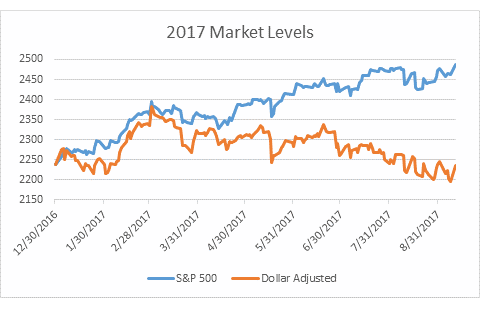A Global Perspective on the US Market High
Investors often raise concerns when the stock market is near an all-time high. I’ve discussed previously why it’s not generally a good idea to sell simply because the market attains a new high, since, if anything, historic evidence points to returns going forward from a market high being superior to average market returns. But the rising 2017 US stock market is a little different from many in the past—while the market has risen year-to-date, the dollar has fallen relative to other currencies.
Note that international investors may not perceive the U.S. at a market high. To illustrate this, I adjusted the S&P 500 by the dollar index on a daily basis and compared that to the level of the unadjusted S&P 500. The dollar index measures the value of the dollar relative to a basket of international currencies. (There is more than one index based on global currencies, but they tell the same story. Using the “broad index” for example, results in the same peak for the adjusted index.) The two return series generally coincide until the market high of March 1, but after that they sharply diverge. Since March 1, US markets have risen and attained new highs, but when adjusted for the falling dollar, the market remains significantly below the March 1 high (6.2% at the time of writing). Perhaps more strikingly, international investors have perceived an overall decline in the US market this year. These results paint a very different perception of international market sentiment in U.S capital markets.
But these results are also important for US based investors. From a purchasing power perspective, the US market peaked in at the beginning of March. Clearly, some of the gains in the US stock market must be attributed to increased competitiveness of exports and the appreciation of foreign assets for multinational companies. Domestic political uncertainty may also be an important factor. This calls into question how much of the recent rise of the stock market is associated with expectations of future growth and the health of the economy. The global economy is not valuing the US market as much as the market high would suggest.

Need more information?
Contact us to find out how we can work with you.